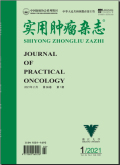实用肿瘤杂志2024,Vol.39Issue(3):258-265,8.DOI:10.13267/j.cnki.syzlzz.2024.039
安罗替尼用于局部晚期鼻咽癌放化疗后辅助治疗的疗效观察
Effect of anlotinib in adjuvant therapy of locally advanced nasopharyngeal carcinoma after radiotherapy and chemotherapy
摘要
Abstract
Objective To analyze the efficacy and adverse reactions of anlotinib in adjuvant therapy of patients with locally advanced nasopharyngeal carcinoma after induction chemotheary and concurrent chemoradiotherapy,so as to find an effective treatment of local-ly advanced nasopharyngeal carcinoma patients with high-risk factors for recurrence.Methods From January 2018 to December 2019,105 cases of locally advanced nasopharyngeal carcinoma undergoing initial treatment were selected from the Second Affiliated Hospital of Guangxi University of Science and Technology(n=73)and People's Hospital of Laibin(n=32).These patients all had at least one high-risk factor for recurrence after 2 cycles of TPF regimen(docetaxel+fluorouracil+cisplatin)induction chemotherapy+cisplatin single-agent concurrent chemoradiotherapy.High-risk factors for recurrence included complete response(CR)unachieved after treatment,Epstein-Barr-virus(EBV)-DNA>100 copies/mL,and stage T4 or N3 before initial treatment.The patients were randomly assigned to anlotinib adjuvant therapy group(n=51)and observation group(n=54).The anlotinib adjuvant therapy group began to have anlotinib adjuvant therapy(anlotinib 12 mg orally once a day before meals for two consecutive weeks and discontinued for one week,three weeks as a cycle)three weeks after the end of the concurrent chemoradiotherapy,for a total of 8 cycles.The observation group was observed only.The 2-year survival of the two groups was compared,and the adverse reactions related to chemoradiotherapy and anlotinib adjuvant therapy were analyzed.Results For the anlotinib adjuvant therapy group and the observation group,the 2-year failure-free survival(FFS)rates were 94.1%and 83.3%(P=0.023),the 2-year distant metastasis-free survival(DMFS)rates were 98.1%and 88.9%(P=0.015),the 2-year overall survival(OS)rates were 98.1%and 94.4%(P=0.081),and the 2-year locoregional relapse-free survival(LRFS)rates were 96.1%and 92.5%(P=0.072).The main adverse reactions of anlotinib were grade Ⅰ and Ⅱ hypertension,fatigue,loss of appetite,hand-foot syndrome,oropharyngeal pain,and rash.After symptomatic treatment,the adverse reactions were significantly relieved.Conclusions For patients with locally ad-vanced nasopharyngeal carcinoma,induction chemotherapy and concurrent chemoradiotherapy followed by anlotinib adjuvant therapy can enhance the 2-year FFS rate of patients,and reduce the probability of recurrence and metastasis.The increased side effects related to an-lotinib can be tolerated by most patients and can be alleviated by treatment.关键词
局部晚期鼻咽癌/同步放化疗/辅助治疗/安罗替尼Key words
locally advanced nasopharyngeal carcinoma/concurrent chemoradiotherapy/adjuvant therapy/anlotinib引用本文复制引用
赵迎喜,蓝柳,韦婷婷,龙亚秀,梁立莉..安罗替尼用于局部晚期鼻咽癌放化疗后辅助治疗的疗效观察[J].实用肿瘤杂志,2024,39(3):258-265,8.基金项目
广西卫生健康委员会自筹经费科研项目(Z20200922) (Z20200922)

